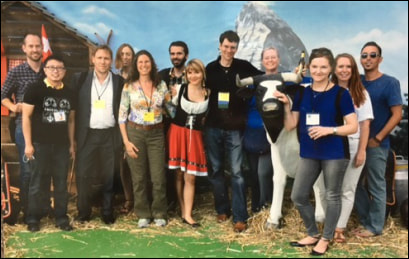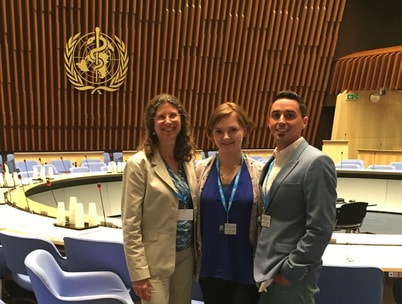|
The Organization of Human Brain Mapping is pleased to announce a new OHBM People’s Choice Abstract Award to be given to one team presenting their research during the 2017 OHBM Annual Meeting poster sessions in Vancouver. The goal of this award is to allow meeting attendees to highlight their favorite presentation and to bring the most popular abstract into the OHBM spotlight. Annual Meeting attendees will vote on their favorite (using in-app voting), and the team who receives the most votes from registered attendees will be awarded the People’s Choice Abstract Award. The first author of the winning team will receive the cash prize of $500 at OHBM 2017 Closing Ceremonies.
HOW IT WORKS OHBM Annual Meeting attendees vote for their favorite abstract using the OHBM mobile app. Each attendee can vote for up to two abstracts, one during each of the two-day blocks (one vote during Monday/Tuesday session and one vote during Wednesday/Thursday session). Any duplicate votes from users or votes from unregistered users will be removed. The abstract with the highest number of votes from unique voters will be announced at the Closing Ceremony. All abstracts presented at the OHBM Annual Meeting, as posters or oral presentations, are eligible for this award. No shows are disqualified from consideration. For questions regarding the new People’s Choice Award, please contact OHBM at [email protected].
0 Comments
BY NIKOLA STIKOV
One of the newest initiatives of the OHBM is the establishment of a replication award to highlight the Organization’s commitment to reproducibility and transparency in neuroimaging research. The OHBM Replication Award will recognize the best replication study of the past year. The 2017 award is generously supported by the Laura and John Arnold Foundation. Continuing with the open science coverage on this blog, I interviewed Chris Gorgolewski at the Center for Reproducible Neuroscience at Stanford University, to discuss the rules and implications of this new initiative. Nikola Stikov (NS): First of all, what is a replication study? Chris Gorgolewski (CG): A replication study is a repetition of a published study procedure with minor changes to variables assumed not to be important for the measured phenomena (this depends on the experiment, but could include demographics, scanner model, visual stimuli delivery system, analysis strategy, etc.). Replication studies usually (but not always) have a larger sample size than the original study for appropriate statistical power, and are performed by a different team than the original study (but planning of a replication study can benefit from involvement of the original researchers). Even though minor changes between the original study and its replication are inevitable they should be minimized as much as possible.  Communications Committee members at OHBM 2017 in Geneva Communications Committee members at OHBM 2017 in Geneva The Communications Committee of the Organization for Human Brain Mapping is beginning its second year and is looking for additional members. This is a great opportunity to become part of a vibrant and thriving committee that produces posts for the OHBM blog, articles for HuffPost Science, conducts video and email interviews with top brain researchers and uses social media to communicate that work to the brain mapping community. The formation of this Committee was approved by the OHBM Council in 2015 with the primary goal of increasing the visibility and impact of members’ work within the OHBM community and to extend it to a broader audience. The Communications Committee is now seeking a few additional volunteers for a three year term. If you have experience writing, editing copy, or in social media, video, graphic design or website maintenance, we hope you’ll consider becoming part of the Communications Committee. OHBM seeks to include a diversity of members from a wide range of geographic locations, different experience levels, and encourages women and minorities to apply. We welcome you to participate in this very important OHBM initiative. If interested, please complete the Call for Volunteers online form no later than Monday, November 28. To apply you must be a current member of OHBM (visit www.humanbrainmapping.org to renew your membership or become a member). Submitted applications will be presented to the Communications Committee leadership for consideration and selection. If you have any questions, please contact Stephanie McGuire, Communications Manager at [email protected].
 Dr. Randy Gollub, Dr. Ekaterina Dobryakova, Dr. Kevin Weiner Dr. Randy Gollub, Dr. Ekaterina Dobryakova, Dr. Kevin Weiner BY EKATERINA DOBRYAKOVA Excerpt from OHBM Communications/Media Team article on Huff Post Science: At the end of June, I found myself through running the streets of Geneva with two other brain mappers--all three of us sweaty from trying to catch the bus. Even though I live in New Jersey and am used to muggy weather in the summer, I couldn’t help but recognize how humid it was. We nearly missed the bus that would take us to the World Health Organization (WHO) to talk about how the Organization for Human Brain Mapping (OHBM) and WHO can work together to improve international public health through brain research. Thankfully, we made it on board and were able to get on with the important work of the day. On July 1st, 2016, I joined a diverse group of behavioral neurologists, radiologists, psychiatrists, neuroscientists and public health professionals from around the world gathered in that building for a joint meeting between the WHO and OHBM. The WHO building opened its doors in 1966 and carries the stamp of time. Interestingly, we were all there to discuss something that could not have even been imagined in 1966 - applications of brain research to matters of public health. Read more. BY NILS MUHLERT
What makes a successful international conference? Getting field-leading researchers to describe their work is of course key, but setting the stage (including hiring the venue, organising transport and arranging evening events) is equally important. As part of our OHBM 2016 insight series, we’ve provided views and highlights from those at the front of the stage - its keynote speakers (including Tim Behrens, Daniel Wolpert, Anissa Abi-Dargham and Nora Volkow) and special interest groups. Here, we look behind the curtain at the local organising team, those whose hard work fools you into thinking that organising an event on this scale is simple. No mean feat when you’re hosting 3,168 participants in one of the world’s most expensive countries! The local organising committee (LOC) in Geneva was chaired by Christoph Michel, Professor of Neuroscience in the University of Geneva and a longtime attendee of OHBM. The LOC was greatly enhanced by the endeavours of a small group of local post-docs who, concerned that Geneva’s high costs might discourage those with tighter travel budgets, formed their own local organizing team, named BrainMeOut, to mitigate that problem. Their efforts provided students, postdocs and early career researchers with easy access to tasty, well-priced food and a chance to enjoy events hosted by this local BrainMeOut team: a varied mix of city tours, swing concerts, networking evenings and open air ping-pong contests (where – to my misfortune - my quiet German colleague revealed her former life as a Tischtennis-Bundesliga player). We speak to Christoph Michel and to Raphaël Thézé, co-director of the BrainMeOut events: |
BLOG HOME
Archives
January 2024
|

 RSS Feed
RSS Feed